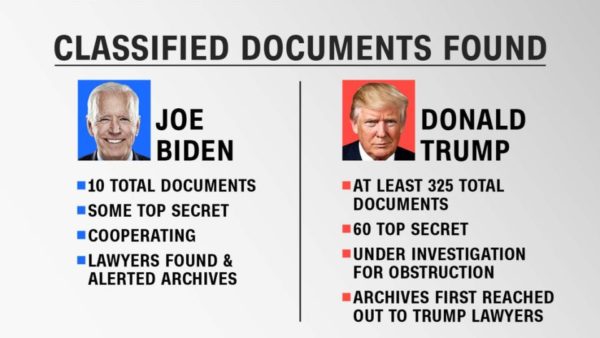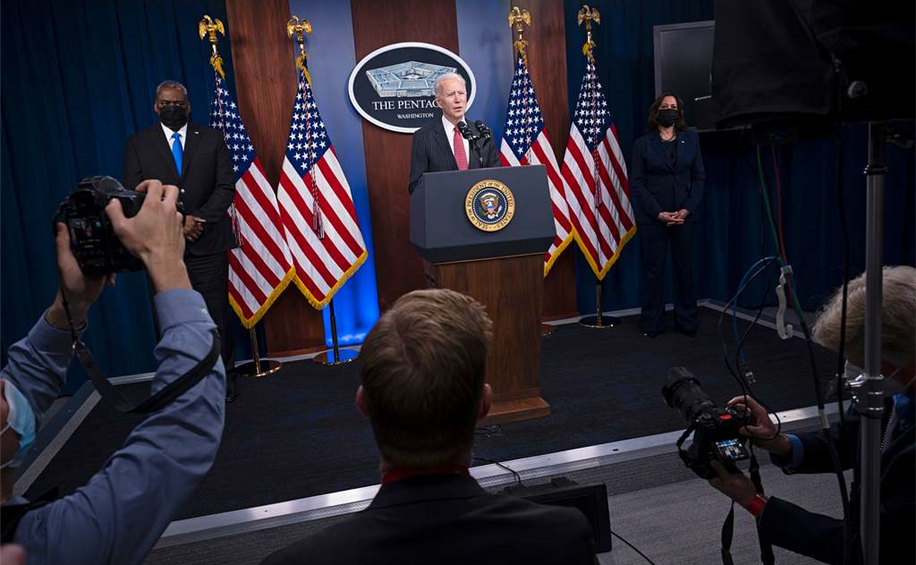Last week, the discovery of classified documents at Joe Biden’s former office and later his home sparked a flurry of news coverage, including comparisons to Donald Trump’s ongoing classified-records scandal.
Critics called out false equivalency in mainstream media’s framing of the two stories, which are different in that Biden failed to appear fully transparent at first but has now cooperated with investigators, while Trump has not.
To explore media’s responses to these document stories, Columbia Journalism Review’s Jon Allsop spoke with Margaret Sullivan, whose column in the Washington Post until last year addressed just this sort of controversy.
In watching Biden’s mishap unfold, Sullivan detected gleefulness from mainstream media because “finally there was something they could jump on, to, legitimate or non-legitimately, create some equivalence between a pretty buttoned-down, boring administration without a lot of scandal and the ever-fascinating circus that was the Trump administration.”
Sullivan said the situation deserved significant coverage, though it went over the top at times. Allsop agreed, and added that early on, outlets like CNN stressed the distinctions between the two cases, almost as if pointing out that they weren’t both-sidesing the stories.

But Allsop identified an “implied both-sidesism” in the apparent prevailing narrative that “Whatever actually happened factually, this is bad for Biden because Republicans say it’s bad — even if the same Republicans, in many cases, just waved off Trump’s mishandling of classified documents.”
Sullivan added that coverage quickly slides from substance to speculation of political fallout. “And if there’s one thing that we should have learned, it’s that journalists are terrible at predictions, but they love to predict anyway.”
A desire to keep the story alive led to nonsense, such as stressing the lack of visitor logs at the former vice president’s private home, clouding the news cycle. Sullivan pointed out that this volume of coverage is disheartening, among other reasons because it generates the impression that “Wow, this is a huge story,” not because of the content of the news, but the amount.
Allsop brought up a remark by Glenn Thrush saying his biggest takeaway from the Biden documents story was “Donald Trump’s gravitational field on American politics,” since, without Trump, no one would care about this sort of thing. Allsop asked if it wasn’t the press’s job to moderate that pull; Sullivan said the press in large part creates it. And for all the talk of the media having elaborate ideas of what they’re doing, Sullivan said it comes down to “This is a great story, let’s go with it, let’s really work it as hard as we can, let’s try to get the next scoop on it.”
The conversation closed by touching on another inevitable comparison that the Biden documents story engendered: Hillary Clinton’s emails, which Allsop noted has become a shorthand for media both-sidesism.
Sullivan said Biden’s story has some protection in the form of Trump’s similar, bigger ongoing controversy, but it does share “the breathlessness with which the [Clinton emails] story has been reported and embraced.” Sulivan assured, “As much as I say that journalists should not predict, I’ll go out on a limb and say that I don’t think this will be anything like that.”
Header Photo by Lisa Ferdinando/Defense Visual Information Distribution Service.

